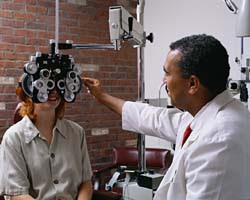
It was early when we found what we wanted to be. Almost immediately we were enamored. One day, after my brother and I had gotten back from the optometrist’s office, we discussed our new found awe and inspiration, our desire to also be optometrists. What was not to like about a job that let you visit different people who sat still in a chair while you moved different lenses in front of their eyes as you asked “1? Or 2?” or “1? Or two?… 1? Or two? Or about the same?” Even at the tender age of 10, I recognized a cushy job when I saw one. And I was sure I could ask someone if lens 1 or 2 made things clearer just as well as they could, if not better.
Now fast forward 15 years…
The morning of my eye appointment, I was thinking of ways to get out of it. It’s not that I’m not all for my visual health, I am. But I have become much more self-conscious and things probing close to my eyes or machines blowing unexpected puffs of air in them are unsettling. And just because I wear contacts doesn’t mean that I should like these things or somehow be better able to handle them, because it’s not the same at all.
“So just don’t go,” I’m told.
It’s specifically the eye dilation part that I don’t want to have done.
“So just tell him you don’t want to do it,” I’m advised.
Aside from the annoyance of the blurred vision and increased sensitivity to light that dilation causes, I am bothered that my optometrist doesn’t look at me. And I find it hard to find it within myself to tell a man who doesn’t look at me that I don’t want him to put the drops in that will paralyze my ciliary muscles.
It seemed we would like each other on that first day we met, having both gone to the same high school and college. Lots to talk about — me and my stint on the high school swim team for 5 days, he and what it was like when the school was only one classroom big, when they rode horses to class… But there is something about a medical professional who doesn’t look at his patients that makes the situation odd and uncomfortable-feeling for the not-looked at patient.
As I’m waiting in a room for the doctor, it’s a great surprise when he walks in because it’s another doctor entirely. He asks me which contacts I’ve decided upon, and when I tell him, he declares what a good choice I’ve made. He says it with such gusto that I feel as though I have solved some ancient riddle that has long been waiting to be figured out or done long division quickly and efficiently in my head.
We then move onto other matters of importance related to my eyesight — he shows me his nice pen with a self-molding grip (it has his name printed near the top and carries an impressive weight when held). I tell him about advertising and explain my time in market research before moving back to the bay. We discuss the property he bought in Florida that has since gone down the hole but will come back, and come back strong when it does, as it’s water-front property.
Then he asks if I like what I do. I tell him I enjoy it. He says “good” and that’s the important part — that I don’t mind going into work. He starts to scribble notes on my chart in the incomprehensible marks and scratches of pen point to paper that doctors use in writing things where clear script would be helpful, like prescription strengths or lab orders.
I am quiet as he writes. I want to make sure he is writing what he means to write. Then I ask him if he likes being an optometrist. He says he does, continues scribbling. (All the while I’m thinking He sure is writing a lot, I must be blind. Maybe he is writing special directions that need to be written in the charts of those who are exceptionally hard of sight.)
I want to ask him if he wakes up in the morning and just wants to go to work, that if given a choice of doing other things he would still choose coming into work. He tells me that he retired a few years ago, after owning his own practice for 32 years and liked being an optometrist so much he stopped being retired and came back to work.